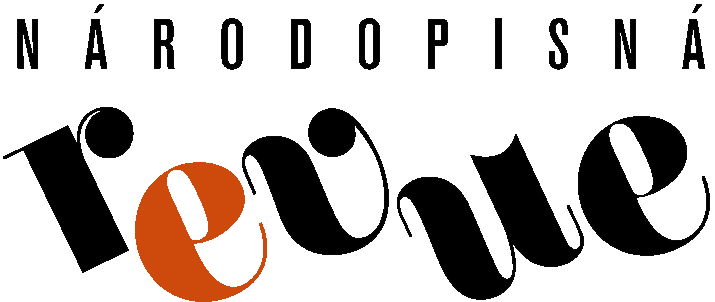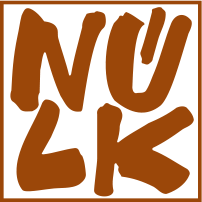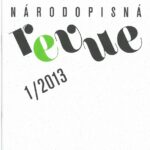Journal of Ethnology 2013/1 presents the theme The Ride of the Kings in Vlčnov - methods of the contemporary research. The research was implemented by the members of the Study Group on Ethnochoreology ICTM and its Sub-Study Group on Field Research Theory and Methods, who did the field research of the Ride of the Kings, a traditional custom surviving in some locations in Moravia. Vlčnov is one such. The research specification was motivated also by the inscription of the aforementioned Ride of the Kings on the UNESCO Representative List of the Intangible Cultural Heritage of Humanity UNESCO in 2011. The research focused especially on the contemporary form of the Ride. It was understood as an experiment that may help reveal new connections, the principle of transmission, and the existence of the phenomenon within different social context. The authors delivered the following essays: The Ride of the Kings from the Point of View of Contemporary Research (Daniela Stavělová), The Ride of the Kings in Vlčnov Seen from Outside (Lise Andersen - Heino Wessel Hansen), The Ride of the Kings in Vlčnov - the course and major themes of the event (Petra Dotlačilová, Petra Slavíková, Kateřina Syslová, Daniela Zilvarová), What Did Vlčnov Live for? Media reports about the Ride of the Kings held in Vlčnov in 2012 (Dorota Gremlicová - Daniela Zilvarová), Ritual and Festival Interplay (on an example of the Ride of the Kings in Vlčnov) (Anca Giurchescu), The Ride of the Kings inscribed on the UNESCO List and a Matter of Sense of Ownership, Control and Decision-Making: Whose tradition, whose heritage? (László Fölfeldi).
Transforming Tradition column includes a contribution titled Street Verbuňk (by Jiří Plocek). Social Chronicle remembers the anniversaries of ethnologists Ludmila Sochorová (born 1927) and Alena Plessingerová (born 1928), and publishes an obituary for musician, collector and ethnoorganologist Josef Režný (1924-2012). Other regular columns include information about exhibitions, folklore festivals, and reviews of new books.
The Ride of the Kings from the Point of View of Contemporary Research (Experiment)
The theoretic study mentions a series of articles that became an output of the international field research, which was initiated by the ICTM Study Group of Ethnochoreology. This study group focuses on the theme of field research within a more specialized ICTM Sub-Study Group of Field Research Theory and Method. The research was aimed at the traditional custom of the Ride of the Kings in Moravian Slovakia, which has been chosen with special reference to the context offered by its inscription on the UNESCO Representative List of the Intangible Cultural Heritage of Humanity. This issue is projected to the perception of the customs by the surroundings, it is reflected in the way of its future sharing by the local community and it offers the field to research its viability and process of changes within the contemporary society. It is a pilot research that was drafted as an experiment because of the specific, collective, supranational and inter-generational approach and the application of some non-standard procedures consisting in combination of monitoring and interviewing techniques. It was one concrete year of the Ride of the Kings in Vlčnov (2012) that was monitored. The data, which the quantitative research concentrated within the restricted time and space, should especially help formulate next procedures, hypothesis and issues aimed at the research of the importance of the mentioned traditional Pentecost custom within the today’s society.
The Ride of the Kings in Vlčnov Seen from Outside
This article is based on field notes made during the international fieldwork organised by the ICTM Sub-Study Group on Field Research Theory and Methods in Vlčnov in 2012. It is written from the position of an outsider. We took into the consideration when you make field research in a society, where you do not talk the language, you have to choose your mission in accordance with your lingual constraints leaving you with the possibility of observing the non-lingual communication between the different “actors” and to analyse the different roles, which were played by these actors. Even for us as foreigners (Danish) it was easy to observe, that during the weekend of the Ride of the Kings, there were more than one feast going on in Vlčnov. Before our eyes, a traditional spring rite was played out side by side with more-commercial elements and a mini folklore festival. We made some photo documentation of the different kinds of amusement going on in the village, but concentrated mainly on the Ride of the Kings itself. The essence of the custom - young men’s riding on decorated horses through the village at springtime - is something well known in many European cultures - the Danish too. Thus, the Ride of the Kings should be compared with a Danish custom rooted in pre-Christian fertility rituals which have two forms - the Shrovetide-ride and the “riding summer in town” at Whitsun - and which seem to have more elements of social control: not receiving the riders was the biggest shame.
The Ride of the Kings in Vlčnov - the course and major research themes of the event
The contribution pays attention to the course of the Ride of the Kings in Vlčnov in relation to its actors, who are mainly the eighteen-year old local boys, so-called legrúti, and the young king and his family. The authors lean especially on the field research that they implemented in Vlčnov during four days between 24th and 27th May 2012, i.e. on the day before the festival and in its entire course. In addition to their on-the-spot observation, it was the interviews with the Ride’s participants, their relatives and other inhabitants of the village that constituted the source of information. The Internet and social networks provided other information. The Ride of the Kings in 2012 was the first one after the custom had been inscribed on the UNESCO Representative List of the Intangible Cultural Heritage of Humanity. During the research, high stress was put on understanding of internal mechanisms in the community of young boys and their families which the Ride is related the most to. It was monitored to which extent the custom is just a spectacle for the visitors and to which extent it is important for its bearers even though a three-day folklore festival has been based on this tradition.
What did Vlčnov live for? Media reports about the Ride of the Kings held in Vlčnov in 2012
The study writes about a quantitative content analysis of published texts which appeared shortly before, during and after the Ride of the Kings in Vlčnov in May 2012. They were published in regional and national printed media as well as in Internet news programme of Czech Television and Czech Radio. The basic question of the authors was how the inscription of the Ride of the Kings in South-East Moravia on the Representative List of the Intangible Cultural Heritage of Humanity has influenced the way of informing about the event. Furthermore, the authors monitored the themes of commercialization, the actors of the event and their place in it and the assessment of the cultural importance of the custom. Separately, they analyzed the picture materials. The analysis pointed to certain discrepancies between the Ride’s aspects accentuated in written commentaries and the choice of photo documents, as well as in understanding of the importance of individual actors and their behaviour in the course of the Ride.
Ritual and Festival Interplay (on an Example of the Ride of the Kings in Vlčnov)
The article is an attempt to analyze the relationship between a ritual event - Ride of the Kings - and the festival organized around it. Ride of the Kings is considered a ritual though its messages and symbols are not fully understood by the community. While the King’s Ride ritual provides a valuable reason for the existence of the festival, the festival - in turn - contributes to the promotion and transformation of the ritual event. There are discussed three modalities of transforming the ritual in theatrical performance: 1. A metaphorical interpretation of the „riders‘ procession“ by the children, on stage; 2. The transformation in spectacle of the most important ritual moment: the dressing of the King in woman‘s clothes. 3. The creation of a concluding fragment performed on stage and presented as an integral part of the traditional procession. The coexistence and interaction between the cultural traditions of the Ride of the Kings ritual, and the arbitrarily added festival have ambivalent consequences. On one hand, the King’s Ride tradition functions to support and legitimate the existence of the touristic festival. On the other hand, because of growing number of outsiders asking for more spectacle, the Ride of the Kings ritual may become progressively a cultural commodity and an integral part of the festival by moving from its traditional physical and social locations on stage or by being transformed into a standardized theatrical performance.
The Ride of the Kings Inscribed on the UNESCO List and a Matter of Ownership, Control and Decision-Making: Whose Tradition, Whose Heritage?
The paper is a kind of personal account on the field research of the Ride of the Kings in Vlčnov (May, 2012). Based on this field notes, the author suggests an approach to the event based on the methodologies of political anthropology focusing on the concepts of ownership, control, decision-making. He proposes that this kind of approach may reveal the motivations and dynamism of the changes made by the participants of the event. The traditional descriptive perspective seems to be not enough for discovering the motivation of the changes year by year. It might be more useful for the researchers to perceive (and to be perceived) the Ride of the Kings in the ’power field´ of different decision-makers related to the event, not only locally, but on regional, national and international levels as well. It may help us answer some questions, for instance: Who decides about the person of the King and other ’actors’, about the route and stations of the procession (the Ride), about the participants of the festival and the fair. Who decided about the change of the original date and time of the ritual, about the age of the King, about turning the former intimate elements of the ritual into public „performances”, e.g. preparation of the Ride of the Kings at the house of his family? Who decided about the nomination of the Ride of the Kings to the UNESCO’s List, in order to make it more visible as an identity symbol? What motivated the decision makers for their decision? The author presumes that the discovery of the sense and consciousness of different kinds of ownership may reveal the system of control and the intentions for taking responsibilities.



